Crimtan was founded by Paul Goad in 2009, who began in the industry with DoubleClick as a founding employee in 1997 before Google acquired it.
The company started as an audience management platform before it built a demand-side platform a few years ago. This evolution meant Crimtan could buy audiences, understand user behaviours, interests, and intent and put ads in front of them in real time.
Now Crimtan is a leader in total lifecycle marketing for programmatic and aims to deliver relevant, consented programmatic advertising that drives incremental ROI..
Though headquartered in London, Crimtan has grown and expanded globally with offices in New York, Dubai, Sydney, and Tokyo.
Leading Crimtan in the Japanese capital is Josh Wilson, JAPAC commercial director. He spoke to Mediaweek about Crimtan’s growth, the impressive range of clients, industry hot topics, and his outlook on the company and industry.
Wilson on leading Crimtan in the JAPAC region and its impressive client portfolio
Wilson joined Crimtan in 2016 just as the company looked into opportunities in Japan. He had previously worked in digital marketing, mainly in affiliate marketing using programmatic technology and social media marketing. He began as a client services manager in Sydney and did consultancy work on exploring Japan as a market.
In 2019, he relocated to Japan to open the Tokyo office and moved up the ranks in the company. Now, as commercial director for the JAPAC region, he oversees the commercial hubs in Australia, Hong Kong, and Tokyo.
Crimtan works with clients from various industries, such as retail, travel, finance, auto brands, B2B, technology, recruitment and education.
Wilson also noted that they also work with governments, such as prefectural governments like Osaka and Tokyo and the Japanese National Tourist Organisation. He said: “Even though that’s a brand we work with here, locally, in Japan, they execute their marketing campaigns outside Japan. We help them with their marketing globally.”
Crimtan has done plenty of work in Australia with BWS and Bank Australia. Globally, the company has done work with Avis, UNICEF and McDonald’s
How Crimtan aims to solve challenges in the industry
Wilson highlighted media wastage/data leakage, the end of cookies and measurement as current hot topics challenging the industry.
Wilson noted that when Crimtan was first established, the hope was for the company to be a one-stop shop for programmatic needs. He explained that the wide range of DSPs available can lead to data leakage or the discrepancy between one system and another if they want to work with other technologies outside the ecosystem.
“With Crimtan, all of the tech is built by us. It’s designed to minimise data leakage because it’s seamless, well-oiled technology.
“Sometimes, the analogy I give clients to explain this is Apple computers. They make the operating system, the screen, the chip, and all of the hardware to a certain extent, and it’s designed not to crash, get viruses and bug out.
“Whereas a PC might be a Dell monitor or a Samsung hard drive. All these bits and pieces coming into that. It’s like trying to stitch things together that may not work together efficiently.”
Wilson highlighted that Crimtan’s solution to data leakage and media wastage is its ArchiTECH. The platform combines DSP, DMP and DCO to deliver powerful marketing insights, ad performance, transparency and efficiency.

Crimtan has been ahead of the curve when it comes to the cookieless future. Wilson said that the company had to change its platform as far back as 2018 to comply with UK and European changes to privacy regulations, including GDPR (General Data Protection Regulation). He noted that such changes have been filtered throughout the company in other markets over time.
However, Wilson said such legislation has taken time to catch up and still has a way to go. He noted that in the past, it was more of an issue for the UK and Europe. But changing technology from companies like Google and Apple has driven countries like Australia to keep up.
“It’s a global problem. For Crimtan, we’re a bit of a thought leader on it because we’ve had to do that since 2018. Our solution is Active ID, which is the ability to do consented relevant advertising, even if we can’t use cookies.”
The third industry issue Wilson highlighted is accurate measurement. He said: “What’s happening in the industry is that media planners or technology platforms that can’t target in a cookieless environment will just exclude certain platforms that have stopped tacking.
“If you’re running a campaign and only targeting half of the online population, you’re missing out on a massive pool of relevant audiences.”
Wilson noted that while many places still use cookies, Crimtan is moving toward helping their clients with professional services and platforms to help analyse what is happening to the campaign. This includes halo effect analysis that looks at the path to conversion, relevancy and how transactions are made, and TMA (Total Media Attribution), a type of mixed media modelling.
“It’s looking at a campaign holistically and then at each channel’s influence on the outcome. Because of changes in legislation, technology and cookies going away, helping our customers understand the success of their campaign is also a hot topic,” he said, noting the halo effect analysis and TMA as bringing visibility to campaigns.
Wilson’s optimistic outlook for Crimtan and the industry
With eight years under his belt at Crimtan, Wilson shared that the outlook ahead is “positive”.
“If I didn’t feel that, I probably wouldn’t be at any other company and speak positively about it. For us at Crimtan, we’re lucky that we have our headquarters in the UK now and a strong presence in the US because they’re the innovators of the ad tech space to a certain extent.
“What happens in those markets usually trickles down to where we are, so being ahead of the curve helps us understand if headwinds are coming up. Like going cookieless, we can prepare for that. Or if it’s a new concept, like attention, we can speak to that to keep ourselves relevant and in the conversation.
Wilson noted that he is looking forward to what is in store for the future.
“There’s going to be a lot of unknowns, like what will happen when cookies phase out. We all have ideas about what’s going to happen, but we still need to find out the reality of the situation. It’s exciting times.
Wilson also highlighted the momentum of programmatic. He said: “A lot of media buying is moving towards programmatic; you can buy a Kia ad in Japan shown on a TV in a cab. You can buy outdoor panels, audio, and Netflix coming to the table with programmatic bias.
“There’s so much going on that it’s hard to keep up. But it’s exciting,” Wilson concluded.
–
Top image: Joshua Wilson
